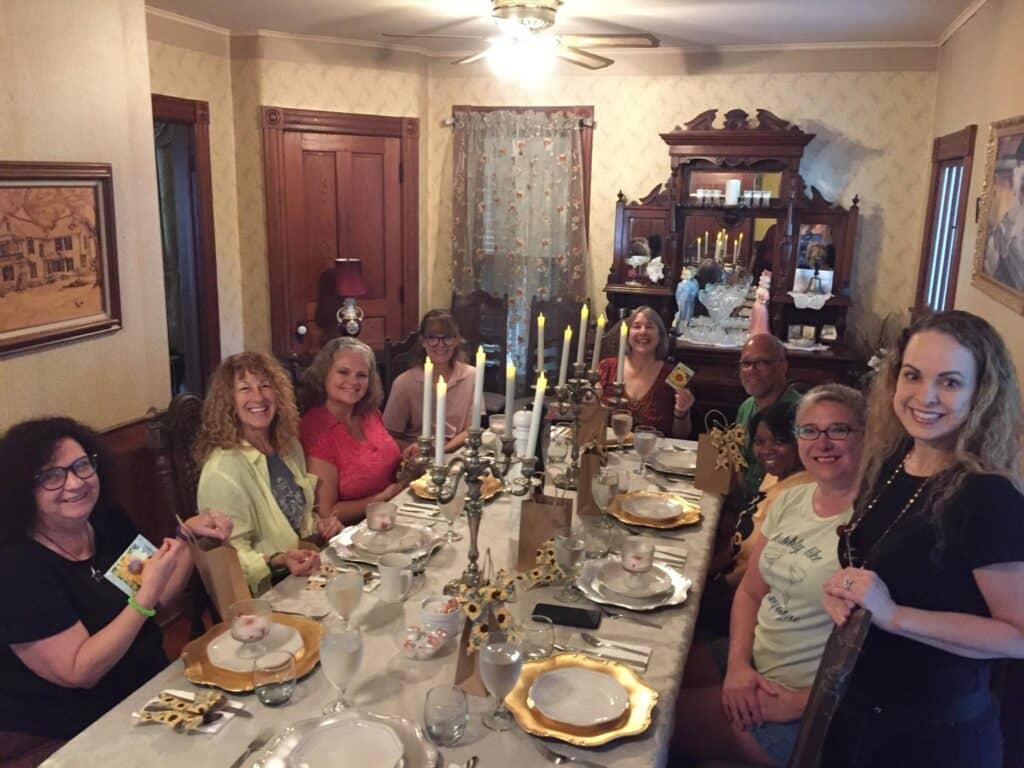Writing retreats offer a chance to work in peace and restore creativity
Sometimes we need to escape our everyday lives and become a hermit for a time to meet that pesky deadline or work out a plot point. Or maybe visit with like-minded souls to remind ourselves why we write and to recharge our creativity.
That’s where writers’ retreats come in, hence the name.
Writing retreats run the gamut. They consist of organized workshops with an itinerary of writing instructors and industry professionals, assembling friends to meet somewhere to share thoughts and information, or quiet places to write in silence. Choosing a writers’ retreat depends on what you need at a specific time. I’ve found solace at the Writers’ Colony at Dairy Hollow in Eureka Springs, Ark.; attended a national retreat where instructors such as Lorin Oberweger critiqued work and offered instruction; and spent a weekend with other writers in a cozy setting that later provided fodder for a novel.
Neil Plakcy attended the Bread Loaf Writers’ Conference at Middlebury College in Vermont, one of the oldest writers’ conferences in the country. Founded in 1926, it offers a 10-day opportunity to work with writers such as MacArthur Fellows, U.S. Poets Laureate, and recipients of the Pulitzer Prize and the National Book Award.
“It had a profound effect on my writing,” Plakcy said. “It was the first place I heard about a thing called an MFA in creative writing. It exposed me to well-known authors like John Gardner, John Irving, and Erica Jong. Even my fellow students were worth talking about—a Yale Younger Poet, a woman whose nonfiction book had been reviewed in the New York Times. I played volleyball with college professors, sang around the piano late at night with editorial assistants and TV production interns. I made long-term friends there, and some of those I knew went on to win major prizes.”
Bread Loaf’s workshops focus more on ideas than grammar, Plakcy explained. “We were reminded that Bread Loaf wasn’t a place to write—it was a place to learn, to talk about writing, and to have fun with like-minded folks. Summer camp for writers.”
For Mindy Klasky, it’s more about sharing space with another writer and producing copy.
“Writing retreats are one of the backbones of my deadline-meeting strategy—and I say that as a full-time writer,” said Klasky, who attends three to four retreats a year with her friend. “We rent an Airbnb in a place relatively close to where we live, within two hours.”
Klasky lets her writing partner choose lodging and she pays for the food. They visit a local grocery store on arrival and stock up on food for the week, but go out to dinner each night.
“I write intensively for a three-hour morning session, a four- to five-hour afternoon session, and a two- to four-hour after-dinner session,” Klasky said. “Over dinners, I present plot problems to my fellow author, and we hash through options. I do the same for her.”
These retreats are for serious work, Klasky said. “I can draft about 40,000 words during the week—sometimes as little as 30,000, sometimes as much as 50,000; my time is less productive if I’m just starting a new novel or if I’m only editing.”
Klasky also uses a “social retreat” a couple of times a year on a weekend with three or four other authors.
“We almost always meet at one woman’s home; she has enough bedrooms for all of us,” she said. “The ‘host’ (rotated among us, even if we’re not at our own homes) is responsible for meals for the weekend; everyone else brings one sweet snack, one salty snack, and a bottle of wine. We work at different paces over the couple of days. Typically, we eat breakfast on our own, then eat lunch and dinner together. We discuss our current projects, business issues in the publishing world, and life in general. I call it a social retreat, because we do much more talking than I do at my writing retreats. My focus is on building bonds and community, rather than meeting a word count.”
Robin Lee Hatcher has been attending a long weekend retreat consisting of 11 writers every summer since 2003.
“Our hostess has a very large home,” Hatcher said. “We brainstorm two to three books a day. If someone doesn’t need brainstorming, they can use their session (75 minutes) for anything they choose. Afternoons and evenings, we just enjoy our time together, take walks in the forest, go into town, etc. We are Christian writers, so there are times of prayer and devotion. Over the years, some have been on deadline so they use the afternoons to write.”
The retreat serves as a reboot, she said. “I always come home refreshed and ready to get back to writing, despite the eight-hour drive going up and again coming home.”
Southern California novelists Glynnis Campbell and Lauren Royal utilize frequent cruises leaving out of Los Angeles ports to both Mexico and Canada. Bargains in the offseason, usually five- to seven-day cruises, allow them to share a cabin for less than $100 per person, per day, meals included.
“Once on the ship, we have breakfast, then write all morning in a deserted lounge, the empty cafeteria, or outside on the promenade deck,” Campbell explained. “We break for lunch, write again in the afternoon, and choose a late supper seating. After a full day of writing, we reward ourselves with dinner, a glass of wine, and a show.”
They each have their own routines, Campbell said—Royal is a late-night writer who reads into the wee hours and Campbell is an early riser who visits the gym in the mornings.
“Other than that, we spend our days together,” she said. “Unless there’s a very interesting excursion, we rarely go ashore, so sometimes we have the ship to ourselves.”
For those who want to use cruises as a retreat, Campbell recommends skipping the pricey internet service—its absence helps writers from getting sidetracked—and having a writing buddy along for the ride to help get the job done.
“We work in silence, though we’ll occasionally interrupt each other to ask for a word or to toss around a few plot ideas,” she said. “Something about body-doubling (working side by side) keeps us honest. The only distractions are when other passengers scold us for bringing work on a cruise. We just reply with, ‘Have you seen a more beautiful office?’”
Some writers attend international events, or bring writers together from different countries. Anne Gracie of Australia began her yearly writing retreat routine in 2007 when she helped a friend find a place for three writers working on a joint series.
“We found an old house beside the sea with 11 bedrooms, and I begged to come, promising that I wouldn’t interfere with their brainstorming,” Gracie said. “Looking at all those empty bedrooms we thought, why not fill them? We’re in Australia, and the published romance writers at that point were flung far across the continent. So, we decided to invite isolated writers to join us.
“At that first retreat, we didn’t all know each other—it was an attempt to help break down some of the ‘tyranny of distance’ that many people experience in Australia,” Gracie continued. “For instance, at the time, the closest one of our members lived to another published romance writer was equal to the distance between London and Moscow, and they both lived in the same state. And of course, one was from another country—New Zealand.”
Gracie has since blogged about her retreats on her website.

The author with her Spalding University alumni writers at a writers’ retreat
last summer in Cassadaga, Fla. The theme was sunflowers.
This past summer, a small group of writers from my alumni association put out a call for a weekend writers’ retreat at Cassadaga Spiritualist Camp in Florida, a community of spiritually minded people that was established in 1894 and today offers self-exploration through psychic study and education. We stayed in the Ann Stevens House 1895 Historic Bed and Breakfast connected to the historic community (Stevens was a founding member), and alternated our time between socializing and writing in silence. We took opportunities to visit the area, including the historic cemetery down the street. One member, a literary agent, offered literary consultations for a small fee while another, a psychic, gave readings in the spirit of the weekend. The retreat concluded with a labyrinth walk.
Although I loved my quiet time at Dairy Hollow in Arkansas, the chance to interact with other like-minded writers was just the boost I needed.
“I think first, it is important to consider and define what you’d like to get out of the retreat—what is the purpose,” said Misty Simon. “If it’s just a group of friends getting away from normal life to boost their writing and just be writers for one weekend, then that’s a whole different animal from putting together a retreat that would involve speakers and scheduled activities.”
Simon prefers the former.
“I get more done when I don’t have to manage anything else when I’m on retreat. It’s also important, especially if this is your first, to make sure you know who you’re inviting and have hope that they will all get along together and have similar purposes for being there.”
Her first retreat in Washington in 2005 had big-name authors, agents, and editors.
“It was wonderful, but there was a lot of pressure for the attendees, hoping to impress the editors and agents, and not a lot of writing,” she said. “In 2006, I started out as a chair for a group retreat within my smallish RWA chapter in Central Pennsylvania. We had under 30 members in the group and about 14 showed up. We knew each other, were all in vastly different places in our writing journey, but we had one main purpose: to write. And that’s what we did while also enjoying time together, meals together, and having a cocktail night and games. We did that for over a decade. I also ran the small ‘three friends at a cabin for a weekend’ retreats where everyone just did their own thing, was responsible for their own food, and talk was more business- or writing-oriented to make plans for the future.”
Bottom line, discover what you need.
“They are all good retreats, but knowing what you’re looking at accomplishing will really help you navigate who you would like there and how many.”
________________________

Cheré Coen writes under the pen name of Cherie Claire. She is the award-winning author of The Cajun Series of historical romances, the Cajun Embassy series of contemporary romances, and a paranormal mystery series featuring New Orleans ghost sleuth Viola Valentine. Her favorite escape is Arkansas’s Writers’ Colony at Dairy Hollow where she holes up like a hobbit to write in a delightful room beneath the main house.
